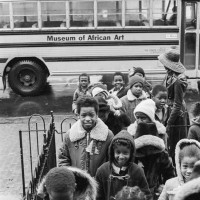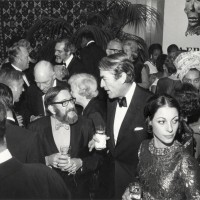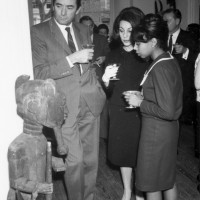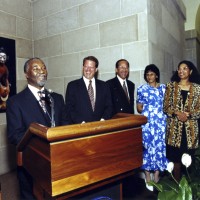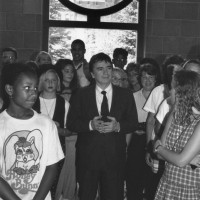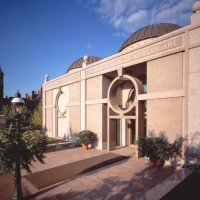Celebrate 50 years of the African Art Museum June 3
The National Museum of African Art celebrates its 50th anniversary Tuesday, June 3, from 10 a.m. to 5:30 p.m. with special performances and events intended to inspire visitors to learn more about the people and cultures of Africa and its diaspora through music, dance, film and art.
The original African Art Museum was founded June 3, 1964, by Warren Robbins in a Capitol Hill townhouse that was the home of abolitionist Frederick Douglass from 1871 to 1877. The anniversary year will honor Robbins’ vision of “cross-cultural communication through education in the arts of Africa”.
Maya Angelou was the honorary chair of the museum’s national campaign. At an event earlier this year, she said, “I want all ages to experience this special 50th-anniversary celebration at the National Museum of African Art. You can sing the songs, dance the dances, see the sculptures and hear the melodies. Not only do you belong to the museum, it belongs to you. Congratulations for the happy anniversary.”
“Our 50th anniversary is all about lifting up the multiple ways in which the visual arts of Africa teach and inspire us to acknowledge and celebrate the diversity and similarities among us,” said Johnnetta Betsch Cole, director of the museum.
The celebration offers something for everyone, including art activities, henna painting, a workshop featuring the weaving crafts of Sierra Leone and Liberia influenced by the museum’s latest exhibition, “Visions of the Forests: The Art of Liberia and Sierra Leone,” an African clothing station titled “Wrappers and Robes, Tunics and Toppers,” demonstrations, a photo selfie station and performances by Eme and Heteru, and Farafina Kan. Michel Martin, host of NPR’s “Tell Me More,” will lead an anecdotal discussion with special guests on the 50 years of the National Museum of African Art. Cole will lead a 50th-anniversary toast with birthday cupcakes from Sprinkles and refreshments from Nando’s Peri Peri.
-
National Museum of African Art, Frederick Douglass House & Plaque
318 A Street, NE
Washington, DC
(Photo by Smithsonian Institution Staff, 1981, Eliot Elisofon Photographic Archives, National Museum of African Art, Smithsonian Institution)
- Schoolchildren visit the African Art Museum on Capitol Hill, December 1977. (Eliot Elisofon Photographic Archives, National Museum of African Art, Smithsonian Institution)
- Warren M. Robbins, founder and Director Emeritus of the Museum of African Art, with actor Gregory Peck, and Veronique Peck (Eliot Elisofon Photographic Archives, National Museum of African Art, Smithsonian Institution)
- Actor Gregory Peck, Veronique Peck, and an unidentified woman admire African art at the Museum of African Art, 318 A Street, NE, Washington, D.C. (Eliot Elisofon Photographic Archives, National Museum of African Art, Smithsonian Institution)
-
South African Deputy President Thabo Mbeki makes brief comments at the U.S. – South Africa Binational Commission meeting reception, July 1997. At his right are: U.S. Vice President Al Gore, South Africa Ambassador Franklin Sonn, Mrs. Sonn, and National Museum of African Art Director Rosyln Walker.
(Photo by Jeff Tinsley, 1997, Eliot Elisofon Photographic Archives, National Museum of African Art, Smithsonian Institution)
-
Actor Dudley Moore visits the National Museum of African Art, ca. 1988 – 1991 (Photo by Janice L. Kaplan,
Eliot Elisofon Photographic Archives, National Museum of African Art, Smithsonian Institution)
- The Smithsonian’s National Museum of African Art
Posted: 30 May 2014
-
Categories:
African Art Museum , Art and Design , Education, Access & Outreach , History and Culture , News & Announcements , Spotlight

